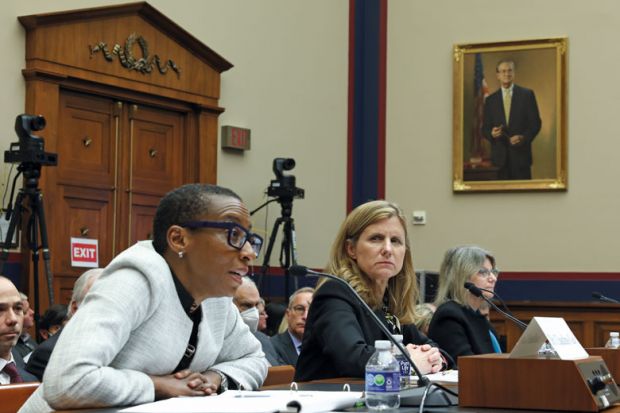By surrendering to a political mob despite the apparent protection of the world’s most powerful university, Claudine Gay has set a precedent that has left academics wondering who else can possibly survive the US’ rising ideological crusades.
Professor Gay stepped down as president of Harvard University after six months of stifling pressure from an alignment of conservative forces, largely navigating the howls of pro-Israel activists, only to succumb to borderline complaints about poor editing in her past scholarly writings.
It amounts to a politically based toppling of the leader of the nation’s most prestigious and well-endowed university, several academics said, with ominous implications for anyone else in academia who dares to persistently challenge the interests of US political and economic wealth.
“This is the most prominent scalp,” said Dov Waxman, professor of political science at the University of California, Los Angeles, and director of its Y&S Nazarian Centre for Israel Studies. “That’s why I think this is going to really embolden those who want to continue this.”
The ultimate success of the plagiarism complaints as the apparently determinative weapon against Professor Gay, he and other academics warned, was especially worrying, since it is an allegation that is becoming very easy to raise with the help of advanced computer tools and often very difficult to adjudicate in a fair and consistent manner.
“Very few of us can probably hold up to that kind of scrutiny,” said Jennifer Ruth, professor of film studies at Portland State University who writes on issues of academic freedom through the American Association of University Professors. “By giving in, Harvard has only set the stage for continuing the expansion of this kind of scare and chilling of academic freedom and targeting of higher ed.”
The endgame for Professor Gay began a month earlier, when she and the heads of two other elite US universities – all women relatively new to their presidencies – agreed to appear before Congress to answer Republican allegations that student protests against Israeli military attacks on Palestinian civilians amounted to campus tolerance of antisemitism. That moment of political theatre – combined with sustained criticism from wealthy individual donors – soon led one of the presidents, Elizabeth Magill of the University of Pennsylvania, to step down.
Professor Gay appeared to have survived the moment, backed by hundreds of faculty demanding that she stay. But she then became consumed by a parallel campaign by conservative activists compiling a list of more than 40 instances – typically brief excerpts of a few sentences or less – that they put forth as evidence that her scholarly record was marred by repeatedly citing others without proper credit.
Professor Gay – the first black president of the nation’s oldest and most prestigious university – said she had resigned “in the best interests of Harvard” to let the institution move forward. In a subsequent article for The New York Times, she described a brief presidency filled with constant attacks including death threats, and urged her academic colleagues nationwide not to succumb to “the loudest and most extreme voices in our culture”.
She acknowledged that her critics were able to find “instances in my academic writings where some material duplicated other scholars’ language, without proper attribution”, but said she immediately corrected such “errors”, and “never misrepresented my research findings, nor have I ever claimed credit for the research of others”.
Academia has long struggled with evaluating what kinds of duplications or apparent duplications in writing deserve what kind of sanction, said Duff Wrobbel, professor of applied communication studies at Southern Illinois University Edwardsville. SIU was home to a 2007 case that led it and numerous US institutions to make more nuanced assessments of the matter, involving a former Democratic congressman, Glenn Poshard, who was obliged by a faculty senate vote to step down as president of the SIU system because of unattributed material in his doctoral dissertation, then allowed to stay after further investigation called it “inadvertent plagiarism”.
Professor Wrobbel said it was usually straightforward to see if a writer intended to be deceitful about sources, and that many scholarly articles contain similar chunks of phrasing because academics – for good reason – share common concepts and a common set of language.
“There’s only so many ways to say something,” he said. “And any time you change a word, you muddy it up, and academics are trained to not do that.”
Yet there was little evidence, said Professor Ruth, that Professor Gay’s critics were interested in that kind of attentive analysis. Even her chief critic in the congressional hearing, Elise Stefanik, was accused by a Democratic colleague of copying large portions of a letter she sent to the Harvard, Penn and Massachusetts Institute of Technology presidents after the hearing demanding their resignations. Ms Stefanik dismissed the duplication as “something that happens every day on Capitol Hill”.
Such instances of apparent hypocrisy from Professor Gay’s antagonists appear to have no effect on critics of higher education, Professor Ruth said, because ideologues have a long list of supporters willing to back them regardless.
“It’s total scare,” she said. “It is part of the rise of fascism.”




